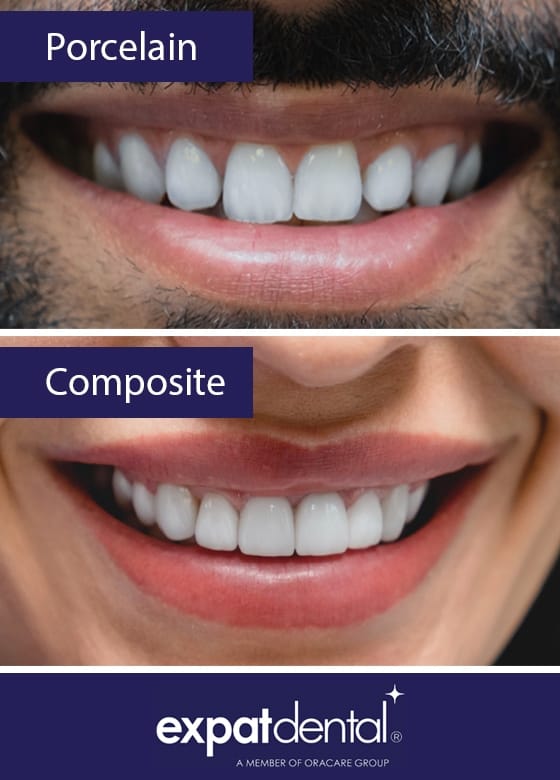Composite vs Porcelain Veneers
Dental veneers can be the first step to improving the aesthetics of your teeth and getting the smile you’ve longed for. Determining what material to go with is the second step.
Composite resin and porcelain are the most commonly used materials in the veneer fabrication process. In the hands of an experienced cosmetic dentist, both materials can beautifully transform your smile. But how do you know which type is right for you? This comes down to your specific needs and which factors are most important to you. Let’s evaluate some of the differences between composite and porcelain veneers.

Although composite veneers do have their advantages, there are a couple of areas in which they cannot compete with porcelain. Porcelain is a far stronger material than composite resin (even with the improvements in resin materials over the years). Well-maintained porcelain veneers can last up to 15 years or even longer compared to the 5-7 year average lifespan of composites. It’s important to consider this tradeoff if you’re thinking of having veneers placed. That is, while composites may cost less than porcelain, they do not last near as long. As such, porcelain is regarded as the better value option over time.
Porcelain veneers offer the most natural, tooth-like aesthetics. Porcelain has a translucent quality that is quite similar to natural tooth enamel. Unlike composites, porcelain is also highly resistant to staining and chipping due to the strength of the material and the glaze that is applied after treatment. Composite veneers are more porous and therefore susceptible to staining, meaning that you may need to adjust your diet in order to avoid certain stain-causing foods. Composite also needs to be polished in order to achieve a tooth-like aesthetic. And even then it doesn’t quite compare to the natural look of porcelain.
The porcelain veneer procedure is made in a lab so temporaries must be worn while you wait for the veneers to be sculpted in a lab. Porcelain veneers offer a viable treatment solution for all cases of worn enamel, wear and tear, genetic defects, uneven teeth and other, similar issues. Composites may not be a viable option for some of these conditions. For example, significant discoloration or spacing issues may not be adequately treatable with composite veneers, making porcelain your only option. Your dentist will conduct a thorough oral health evaluation as part of your consultation to determine your options.
The best way to determine whether a composite or porcelain veneer solution is right for you is to speak with your dentist about your aesthetic goals and to weigh your personal considerations.
If you’re looking for a cost-effective, shorter term solution, then a composite veneers treatment plan may be a good fit. However, if you are looking for the most natural and much longer term solution then porcelain veneers will give you a fantastic result.
Regardless of which material you opt for in the end, you can rest assured that both offer fantastic smile enhancement.
FAQs

Service Warranty
Keep up on your regular routine cleanings and if something breaks, we’ll fix it at no cost. Learn more

Transparent pricing
You will have the full breakdown of any treatments and pricing upfront so there are no surprises.

Internationally certified
Our dental team comes from the US, UK, Canada and Singapore, and have served more than 13,000 patients!

Novena Medical Center
- 10 Sinaran Drive, Unit 08-15/16, Novena Medical Center, Singapore 307506
- +65 6397 6718
- Monday
- 9am – 5pm
- Tuesday
- 9am – 5pm
- Wednesday
- 9am – 5pm
- Thursday
- 9am – 5pm
- Friday
- 9am – 5pm
- Saturday
- 9am – 5pm
- Sunday & Public Holidays
- Closed
Our staff will be in touch within 24 hours or our next business day.
